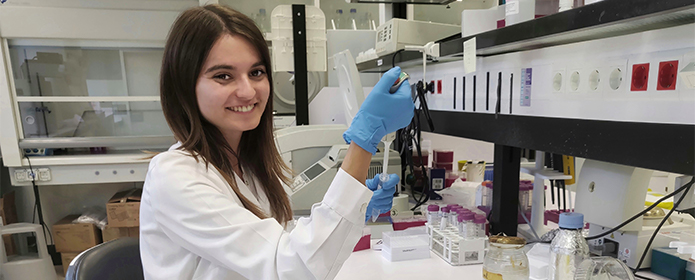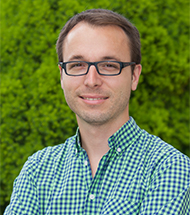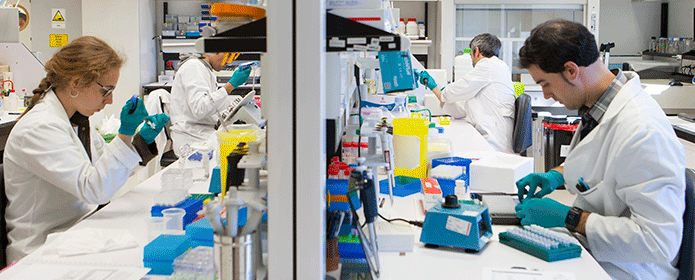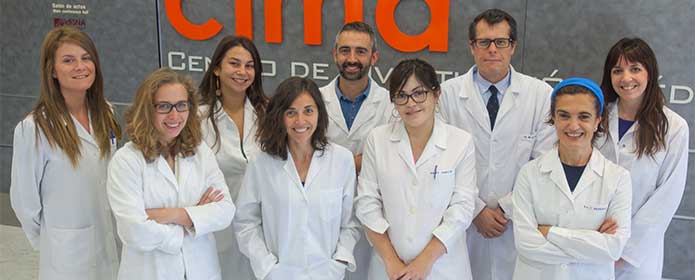An international project of research will study in a pioneering way the detection and early intervention in hematological tumors.
The project, in which 13 European centers participate, is led by Dr. Jesús San Miguel, director of Clinical and Translational Medicine at the University of Navarra.
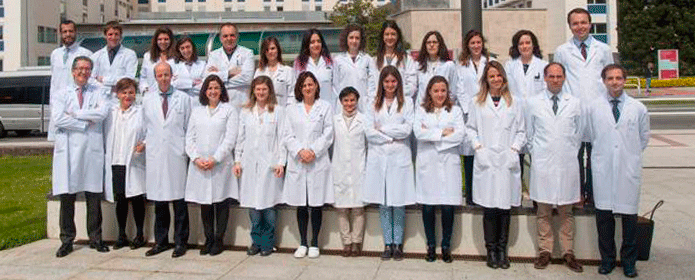
goal Early detection of hematological tumors in order to treat them as early as possible and thus achieve a cure is the main goal of an international research that has been selected as a priority by a European consortium of cancer associations.
The project has received one of the 6 "Accelerator Awards", an international call for proposals whose goal is to accelerate the progress of the research in cancer so that the results reach patients as soon as possible, and is one of the four European studies with a relevant participation of Spanish research groups. Moreover, in this case, the study is of special interest as it is the first to be led by a Spanish researcher , Dr. Jesús San Miguel, director of Clinical and Translational Medicine at the University of Navarra.
The awards have been convened to promote and accelerate the progress of translational research in cancer. The promoters of this initiative are association Española Contra el Cáncer (AECC), Cancer Research UK and association Italiana para la research del Cáncer. In total, 34 million euros, destined to finance 6 projects of research in cancer, of which 5 million have corresponded to project led by Dr. San Miguel.
Choice of three types of hematologic tumors.The prognosis of hematologic malignancies has improved substantially in the last decade, although only a small proportion of patients are cured.
The problem, according to Dr. San Miguel, "is that these patients are probably being treated only when their cancer is fully developed. There is no doubt that the best opportunity to eradicate cancerous cells is early detection and intervention".
Specifically, project has focused on the study of three groups of hematological diseases:
- Monoclonal gammopathies (multiple myeloma).
- Myelodysplastic syndromes and myeloblastic leukemia.
- Follicular lymphomas.
The researchers have selected these three groups of neoplasms because together they account for 50% of hematological cancers. "The reason for selecting them is that they share unique mechanisms of tumor progression, from benign cells to their transformation into malignant cells," says the scientist. The goal of this group is to try to eradicate these three types of cancer, focusing on two critical stages of the disease process: the premalignant stage and the stage of minimal residual disease.
"We want to understand the mechanisms of transformation and resistance as a framework that leads us to be able to address early stages of the disease, rather than by the fully developed disease with all its symptomatology," describes Dr. San Miguel. "In this way we aim to increase the fees of cure."
Participating centersTo carry out this project , 13 centers of excellence that share a common interest in early detection and intervention, grouped around three nodes of three nationalities, have come together:
The Spanish center, led by Dr. San Miguel, is also in charge of coordinating the work of the 13 centers on monoclonal gammopathies-multiple myeloma.
The Italian led by Dr. Mario Cazzola of the Fondazione IRCCS of the Policlinico San Matteo Hospital in Pavia who will lead the research on myelodysplasia and myeloblastic leukemia.
The English group will be led by Dr. Jude Fitzgibbon, of the Barts Cancer Institute at Queen Mary University of London, who will coordinate the efforts of all centers to understand the mechanisms of transformation and resistance in follicular lymphomas.
ObjectivesWith this project accelerator the researchers aim to implement new tools that will facilitate the academic community development of innovative solutions to accelerate the use of precision medicine in the daily clinical internship . More specifically, emphasizes Dr. San Miguel, "we want to develop new tools to detect, purify and characterize the cells that are transformed, both in the premalignant stage and in the residual disease stage".
The researchers also intend to generate large instructions from data that include a multi-omic characterization of normal, tumor and immune system cells, as well as to define biomarkers for early intervention, both in the premalignant and minimal residual disease state, and to create animal models that reproduce the natural evolution of these diseases.
The project will have a duration of 5 years. The centers that constitute the Spanish node of this accelerator are:
- The Clínica Universidad de Navarra together with the research center Applied Medical (CIMA).
- The Engineering School of the University of Navarra in San Sebastian.
- The 12 de Octubre Hospital in Madrid.
- The University Hospital of Salamanca/research center of Salamanca Cancer.
- Fundació Clinic per a la Recerca Biomèdica de Barcelona.

